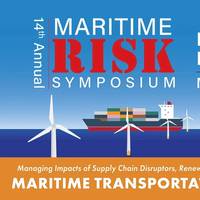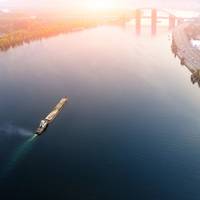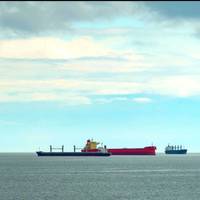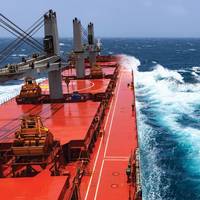14th Annual Maritime Risk Symposium to be Held Nov. 14-16 at SUNY Maritime

The 2023 Maritime Risk Symposium (MRS) will be held Nov. 14-16, 2023, as an in-person event, hosted by Maritime College, State University of New York (SUNY) at the Maritime Academic Center. The theme of the 14th annual event is “Managing Impacts of Supply Chain Disruptors, Renewable Energy, Emerging Technology on the Maritime Transportation System (MTS)” with a focus on offshore infrastructure risk and disruptors. Founded in 1874, Maritime College is the oldest maritime college in the United States, providing mariner training for 150 years.
Maritime Risk Symposium 2022: The Importance of Inland Systems to the MTS

The 2022 Maritime Risk Symposium (MRS) is scheduled to be held Nov. 15-17, 2022, hosted by Argonne National Laboratory at the Argonne campus in Lemont, Illinois. MRS is an annual international event focused on risks involving the global maritime transportation system (MTS). For the MRS, the U.S. Coast Guard partners with the sponsor, the Transportation Research Board of the National Academies of Science, Engineering, and Medicine, and the hosting agency. MRS began in 2011 and has grown in size, scope and interest. The MRS event will be followed by the U.S.
Exploring All Too Real Maritime Risks

The 11th Annual Maritime Risk Symposium: A Virtual Event Exploring All Too Real RisksThe past year has been as impactful for the world’s maritime transportation xystem as it has been for the rest of society. From the Suez Canal to the Arctic and beyond, human, technology and environmental events disrupted maritime activity. And the pandemic highlighted supply chain vulnerabilities in many ways, from mariners quarantined aboard vessels to port congestion due to COVID-driven surges in e-commerce.
Maritime Risk Symposium, Nov. 12-15 at SUNY Maritime

The State University of New York Maritime College, in collaboration with the U.S. Coast Guard, National Academy of Sciences, academic institutions, industry partners, and federal, state and local agencies, will host the 10th Annual Maritime Risk Symposium (MRS 2019) Nov. 13-15, 2019, at New York Maritime College located in the Bronx, New York.MRS 2019 will bring together academics, government and commercial entities to discuss the threats, challenges and risks associated with the Marine Transportation System with a focus on current and future marine transportation challenges and threats.
2018 Maritime Risk Symposium – Energy and Maritime Risk
Energy.It seems that energy touches every aspect of our lives from heating our homes to ensuring that fresh produce is available at grocery stores. It powers our cars and allows industry to move products around the world. The connection between energy and risk to the maritime environment has been a growing area of discussion, research and analysis. The United Kingdom’s Royal Navy, within its Joint Doctrine Publication (JDOP 0-10) 5th edition UK Maritime Power, captured this issue superbly: “Fossil fuels and minerals are an important resource in the maritime environment. New deposits of oil and gas, as well as mineral wealth, are discovered under the seabed each year, and improvements in technology will facilitate future exploitation.
Report Warns of Attacks on Cruise Ships, Ferry Boats
Limiting maritime security to screening cargo arriving at U.S. seaports is a dangerous mistake, according to a new RAND Corporation report, which suggests that cruise ships and ferry boats offer rich and often easier targets for terrorists. "Focusing solely on securing the container supply chain without defending other parts of the maritime environment is like bolting down the front door of a house and leaving the back door wide open," said Henry Willis, a RAND researcher and a co-author of the report in a press release. According to the report, Maritime Terrorism: Risk and Liability, attacks on civilian cruise ships and ferry boats would fulfill the three main goals of contemporary terrorist attacks -- visibility, destruction and disruption.












